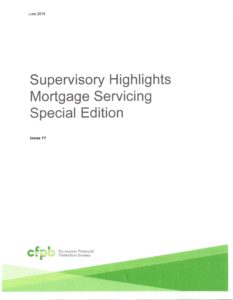 The federal Consumer Financial Protection Bureau (CFPB) recently issued its “Supervisory Highlights – Mortgage Servicing – Special Edition” (Issue 11), addressing examination issues reportedly found as to loss mitigation acknowledgement notices, loss mitigation offers and related communications, loan modification denial notices, servicer policies and procedures, and servicing transfers.
The federal Consumer Financial Protection Bureau (CFPB) recently issued its “Supervisory Highlights – Mortgage Servicing – Special Edition” (Issue 11), addressing examination issues reportedly found as to loss mitigation acknowledgement notices, loss mitigation offers and related communications, loan modification denial notices, servicer policies and procedures, and servicing transfers.
Of note, the Supervisory Highlights also addresses the CFPB’s approach to mortgage servicing examinations, including as to recent changes to the mortgage servicing chapter of the CFPB Supervision and Examination Manual.
A copy of report is available at: Link to Report.
The CFPB summarized its findings as follows:
Outdated and deficient servicing technology continues to pose considerable risk to consumers in the wider servicing market. These shortcomings are compounded by lack of proper training, testing, and auditing of technology-driven processes, particularly to handle more individualized situations related to delinquencies and loss mitigation processes. None of these problems is insurmountable, however, with the proper focus on making necessary improvements, especially in the information technology systems necessary for effective implementation. Supervisory examinations do show that some servicers have significantly improved their compliance positions, and this edition concludes by sharing how these servicers have strengthened their compliance.
Loss Mitigation Acknowledgment Notices
Among other things, according to the CFPB, examiners found the following errors as to loss mitigation acknowledgment notices:
- Stating that documents were due by a deadline or that foreclosures would not occur before a deadline passed for submitting missing documents, but then denying modifications or foreclosing before the submission deadline. Of note, the CFPB “determined the representations to be deceptive, independent of whether or not the servicing rules permitted the servicer(s) to foreclose on the specific borrower(s) at that time.”
- Sending acknowledgment notices that did not “state the additional documents and information for borrowers to submit to complete the application, such as income and tax forms that the servicer’s internal records showed were necessary at that time,” but instead requesting the documents by separate letter “several weeks after the acknowledgment notice.”
- Requesting irrelevant or inapplicable documents, or documents that the borrower already submitted.
- Not including “any reasonable date by which borrowers must return additional documents and information.”
- Failing to “include a statement that borrowers should consider contacting servicers of any other mortgage loans secured by the same property to discuss available loss mitigation options.”
Loss Mitigation Offers and Agreements
Among other things, according to the CFPB, examiners found the following errors as to loss mitigation offers and agreements:
- Stating that the servicer would defer outstanding fees, charges, and advances to the maturity date of the loan, but then assessing many of these charges when the borrowers signed and returned the permanent modification agreements.
- Using proprietary modification offers that “made it impossible for a borrower to understand the true nature of how and when these charges would be assessed.”
- Using response deadlines that had already passed.
- Generating letters in a timely fashion, but then delaying their delivery.
- Sending offer letters with unapproved terms.
- Stating in “trial period plans that borrowers would receive a permanent modification after making three trial payments” without conditioning the offer on the results of a title search, and then denying a “permanent modification based on the results of a title search.”
- Treating “self-employed gross income as net income when evaluating loss mitigation applications.”
- Not timely converting trial modifications into permanent modifications, and then capitalizing the additional interest due under the pre-modification rate into the principal balance owed under the permanent modification, and continuing to report the borrowers as delinquent during the period of the delay.
- Stating that “deferred interest would be repayable at the end of the loan term when, in fact, the servicer collected the deferred interest from consumer immediately after the deferment ended.”
- Including waivers of consumer rights in loss mitigation agreements.
Policies and Procedures
Among other things, according to the CFPB, examiners found the following errors as to servicer policies and procedures:
- Not “promptly identifying and facilitating communication with the successor in interest of the deceased borrower with respect to the property secured by the deceased borrower’s mortgage loan,” but instead requiring “probate for borrowers to establish themselves as successors in states where probate was not required.”
- “[S]oliciting loss mitigation applications when internal records showed that the borrowers were not eligible for any loss mitigation option.”
- Not identifying and processing materials submitted by borrowers to complete a loss mitigation application, including “date-stamping, cataloging and distributing loss mitigation material to appropriate Departments.”
- Evaluating loss mitigation “applications only for the loss mitigation options preselected by servicer personnel and not for all options available to the borrower.”
- Not properly sharing accurate and current information regarding the status of loss mitigation, such as with foreclosure counsel.
- Not identifying “necessary documents, including loss mitigation agreements and mortgage notes not transmitted by the transferor” servicer.
Servicing Transfers
Among other things, according to the CFPB, examiners found the following errors as to servicing transfers:
- Not honoring in-place trial modifications following transfers of servicing.


